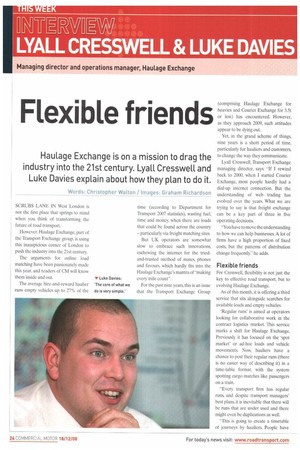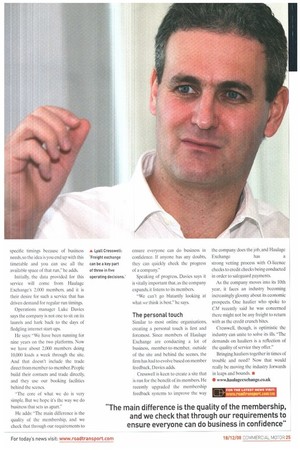Flexible friends
Page 24

Page 25

If you've noticed an error in this article please click here to report it so we can fix it.
Haulage Exchange is on a mission to drag the industry into the 21st century. Lyall Cresswell and Luke Davies explain about how they plan to do it.
Words: Christopher Walton / images: Graham Richardson SCRUBS LANE IN West London is not the first place that springs to mind when you think of transforming the future of road transport.
However, Haulage Exchange, part of the Transport Exchange group, is using this inauspicious corner of London to push the industry into the 21st century.
The arguments for online load matching have been passionately made this year, and readers of CM will know them inside and out The average hire-and-reward haulier runs empty vehicles up to 27% of the time (according to Department for Transport 2007 statistics), wasting fuel, time and money. when there are loads that could be found across the country — particularly via freight matching sites.
But UK operators are somewhat slow to embrace such innovations, eschewing the intemet for the triedand-trusted method of mates, phones and favours, which hardly fits into the Haulage Exchange's mantra of -making every mile count".
For the past nine years, this is an issue that the Transport Exchange Group (comprising Haulage Exchange for heavies and Courier Exchange for 3.5t or less) has encountered. However, as they approach 2009, such attitudes appear to be dying out.
Yet, in the grand scheme of things, nine years is a short period of time, particularly for hauliers and customers. to change the way they communicate.
Lyall Cresswell, Transport Exchange managing director, says: "If I rewind back to 2000, when I started Courier Exchange, most people hardly had a dial-up intemet connection. But the understanding of web trading has evolved over the years. What we are trying to say is that freight exchange can be a key part of three in five operating decisions.
"You have to move the understanding to how we can help businesses. A lot of firms have a high proportion of fixed costs, but the patterns of distribution change frequently." he adds.
Flexible friends
For Cresswell, flexibility is not just the key to effective road transport, but to evolving Haulage Exchange.
As of this month, it is offering a third service that sits alongside searches for available loads and empty vehicles.
'Regular runs' is aimed at operators looking for collaborative work in the contract logistics market. This service marks a shift for Haulage Exchange, Previously it has focused on the 'spot market' or ad-hoc loads and vehicle movements. Now, hauliers have a chance to post their regular runs (there is no easier way of describing it) in a time-table format, with the system spotting cargo matches like passengers on a train.
"Every transport firm has regular runs, and despite transport managers' best plans, it is inevitable that there will be runs that are under used and there might even be duplications as well.
"This is going to create a timetable of journeys by hauliers. People have specific timings because of business needs, so the idea is you end up with this timetable and you can use all the available space of that run," he adds.
Initially, the data provided for this service will come from Haulage Exchange's 2,000 members, and it is their desire for such a service that has driven demand for regular run timings.
Operations manager Luke Davies says the company is not one to sit on its laurels and hark back to the days of fledgling internet start-ups.
He says: "We have been running for nine years on the two platforms. Now we have about 2,000 members doing 10,000 loads a week through the site. And that doesn't include the trade direct from member-to-member. People build their contacts and trade directly, and they use our booking facilities behind the scenes.
-The core of what we do is very simple. But we hope it's the way we do business that sets us apart."
He adds: "The main difference is the quality of the membership, and we check that through our requirements to ensure everyone can do business in confidence. If anyone has any doubts, they can quickly check the progress of a company.
Speaking of progress, Davies says it is vitally important that, as the company expands, it listens to its members.
-We can't go blatantly looking at what we think is best." he says.
The personal touch
Similar to most online organisations, creating a personal touch is first and foremost. Since members of Haulage Exchange are conducting a lot of business, member-to-member, outside of the site and behind the scenes, the firm has had to evolve based on member feedback, Davies adds.
Cresswell is keen to create a site that is run for the benefit of its members. He recently upgraded the membership feedback systems to improve the way the company does the job, and Haulage Exchange has a strong vetting process with 0-licence checks to credit checks being conducted in order to safeguard payments.
As the company moves into its 10th year, it faces an industry becoming increasingly gloomy about its economic prospects. One haulier who spoke to CM recently said he was concerned there might not be any freight to return with as the credit crunch bites.
Cresswell, though, is optimistic the industry can unite to solve its ills. "The demands on hauliers is a reflection of the quality of service they offer."
Bringing hauliers together in times of trouble and need? Now that would really be moving the industry forwards in leaps and bounds. • • www.haulageexchange.co.uk




































































































































































